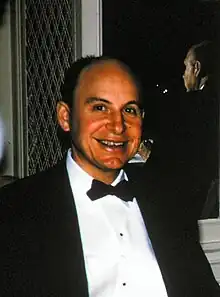Eugene G. Rochow
Eugene George Rochow (October 4, 1909 – March 21, 2002) was an American inorganic chemist. Rochow worked on organosilicon chemistry; in the 1940s, he described the direct process, also known as the Rochow process or Müller-Rochow process.
Eugene G. Rochow | |
|---|---|
 Rochow in 1965 at the ACS meeting in Detroit | |
| Born | October 4, 1909 |
| Died | March 21, 2002 (aged 92) |
| Nationality | American |
| Alma mater | Cornell University |
| Awards | Perkin Medal (1962) |
| Scientific career | |
| Fields | Inorganic chemistry |
Born in Newark, New Jersey, Rochow grew up in Maplewood, New Jersey and attended Columbia High School, where teachers fostered his interest in math and chemistry.[1] He obtained both B.S. and Ph.D. degrees from Cornell University in 1931 and 1935 respectively. Upon completion of his Ph.D., he began working for a General Electric subsidiary. In 1948, Rochow resigned from GE due to his Quaker beliefs.[1] He joined the faculty at Harvard University where he remained until his retirement in 1970. He was elected a Fellow of the American Academy of Arts and Sciences in 1949.[2] He is known for developing, with A. Louis Allred, the Allred-Rochow electronegativity scale.[3] In 1962, he was awarded the Perkin Medal.[4] Rochow died in Fort Myers, Florida aged 92.
References
- Bohning, James J. (24 January 1995). Eugene G. Rochow, Transcripts of Interviews Conducted by James J. Bohning in Fort Myers, Florida on 24 January 1995 (PDF). Philadelphia, PA: Chemical Heritage Foundation.
- "Book of Members, 1780–2010: Chapter B" (PDF). American Academy of Arts and Sciences. Retrieved July 26, 2011.
- Allred, A.L.; Rochow, E.G. (January 1958). "A scale of electronegativity based on electrostatic force". Journal of Inorganic and Nuclear Chemistry. 5 (4): 264–268. doi:10.1016/0022-1902(58)80003-2.
- "Past Perkin Medallists". SCI America. Retrieved 21 February 2018.
External links
- Center for Oral History. "Eugene G. Rochow". Science History Institute.
- Bohning, James J. (24 January 1995). Eugene G. Rochow, Transcripts of Interviews Conducted by James J. Bohning in Fort Myers, Florida on 24 January 1995 (PDF). Philadelphia, PA: Chemical Heritage Foundation.